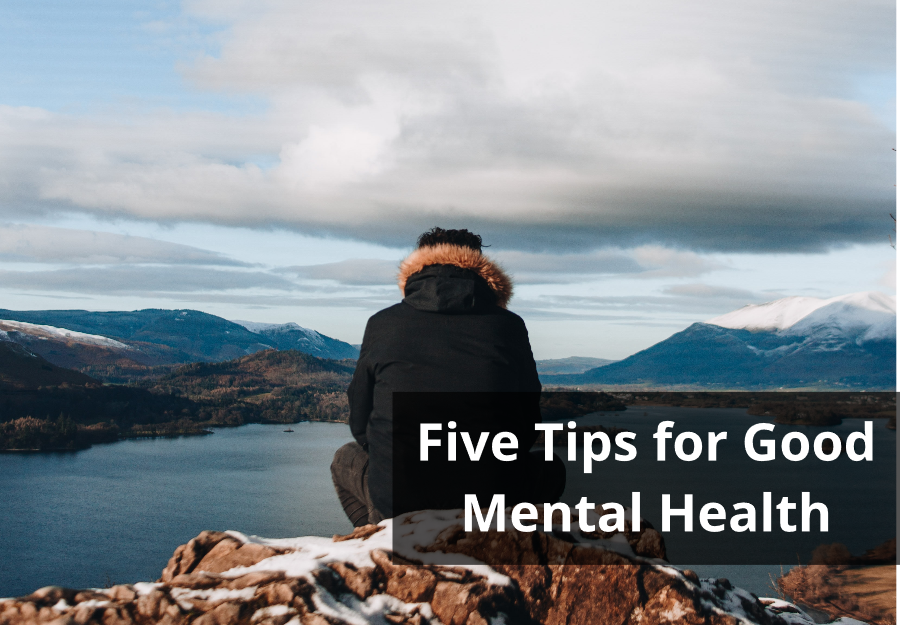Total Therapy Blog

Five Tips for Good Mental Health
This article was written by our Clinical Counsellor, Kate Bilkevitch.
I believe that the main purpose of counselling is to help you achieve empowerment to cope with various life situations, reduce emotional stress, and attain personal growth. I truly believe in the eclectic approach to counselling, which means that I draw upon multiple theoretical perspectives in my clinical work. My approach is always guided by your individual needs and concerns.
Five Tips for Good Mental Health
World Mental Health Day, observed on October 10 of each year, has been celebrated for over 25 years. This day raises awareness of mental health issues around the world. First celebrated by the World Federation for Mental Health (WFMH) in 1992 this day “celebrates awareness for the global community in an empathetic way, with a unifying voice, helping those feel hopeful by empowering them to take action and to create lasting change” (WFMH, 2009).
We often hear about the importance of maintaining good mental health. But what is mental health? Mental health includes our psycho-emotional and social functioning. The World Health Organization defines Mental Health as “a state of well-being in which every individual realizes his or her own potential, can cope with the normal stresses of life, can work productively and fruitfully, and is able to make a contribution to her or his community” (WHO, 2014). So what are some steps you can take to improve your mental health? Here are five things you can do for your mental health.
1. Exercise, exercise, exercise

In fact, I would make it tip 1, 2 and 3! If you are only going to take away one of the five tips, I hope it’s this one. Physical exercise works wonders for improving and maintaining good mental health. When you exercise your brain releases chemicals (neurotransmitters) that actually make you feel better. Endorphins (often referred to as natural opioids) are neurotransmitters that relieve stress and pain. Moreover, regular exercise improves your levels of serotonin (also known as “the happy chemical”). Serotonin directly contributes to our wellbeing and happiness and boosting serotonin levels improves our mood, sense of well-being, sleep and appetite.
2. Diet

It should come to no surprise that the food we eat affects our physical health. But as it turns out, our diet also affects our mental health. In fact, most of the serotonin (remember the happy chemical from tip number 1?) in your body is produced in your gastrointestinal tract! People who eat a lot of fruit and vegetables, unprocessed grains and seafood have significantly lower risk of depression. So turns out your folks were right: eat your vegetables!
3. Sleep

Just as is the case with exercise and diet, there is a clear connection between sleep and mental health. You may have heard of different stages of sleep. During the various stages of sleep your body and brain function differently. For instance, during the deep sleep (stage 3) your brain activity slows down, your heart rate and body temperature drop and your body relaxes. However, at the Rapid Eye Movement (REM sleep, also known as dream sleep) stage of sleep the opposite happens. The brain activity picks up and resembles that of the awake state. The REM sleep is believed to help people process complex information, thereby contributing to our emotional health. Each person goes through these stages every 60 to 90 minutes. But! Turns out that the length of each stage in the 60-90 minute cycle changes as the night progresses. So if at the beginning of the night you will have longer stage 1 and 2 sleep stages toward the end of the night you will begin to have longer REM stages. In fact, the longest REM stages will occur in the 7th and 8th hours of sleep. So if you only get 5-6 hours of sleep each night you are robbing yourself of the REM sleep your brain so desperately needs to feel better. And while an occasional “all-nighter” will not seriously impact your mental health, consistent sleep deprivation surely might.
4. Learn to manage stress

Learning to manage our stress is very important for good mental health. Our autonomic nervous system consists of two parts: sympathetic nervous system and parasympathetic nervous system. The first one is activated when we are threatened (the “fight or flight response”). Our heart rate goes up, digestive activity is inhibited and blood flow goes to the extremities (to fight or flee from the danger). The parasympathetic nervous system (the “rest and digest” response) is activated when we are relaxed. Salivary glands start producing saliva, heart rate decreases, blood flows to the digestive tract and our muscles relax. Our body is thus perfectly designed to deal with an occasional threat (e.g. run away from a dangerous animal in the woods). Stress response is perfectly helpful when we need to deal with life-threatening situations. But nowadays stressors are different: there is no predator we need to run away from (most of the time). Modern day stress is chronic and usually does not threaten our physical self. However, our bodies are biologically designed to respond to all stress in the same way. Therefore, we end up with an activated sympathetic nervous system (stress response) even when such activation is of no use to us! You don’t need an increased heart rate when stuck in traffic and late for work. If our stress response is activated too often (or chronically) we can experience various physical and mental health problems. Therefore, learning good stress management techniques to help de-activate the sympathetic nervous system when you don’t need it is incredibly helpful. Some helpful stress management techniques include:
- Manage predicable stressors
- Be assertive
- Practice relaxation techniques
- Learn time management skills
- Minimize negative coping skills (e.g. alcohol/drugs/gambling)
- Build and maintain social support network
5. Build a social support network

This is directly related to the last point in the preceding section. Building and maintaining a solid social support network is key to maintaining good mental health. Human beings are inherently social beings. Extensive research in the past several decades has clearly demonstrated a strong relationship between social support and good mental health. Social support network can include family, intimate partner, friends, acquaintances, colleague, healthcare professionals, neighbours etc. Building and maintaining a good social support network requires time and effort; but the benefits of having a strong social support network are enormous. What can help you build a strong social support network? Here are some tips:
- Nurture your relationship with intimate partner and close family
- Meet new people by joining social activities, volunteering, taking courses, joining hobby/interest classes
- Utilize social networking platforms
- Avoid and let go of negative/unhealthy relationships
- Improve your social skills
References:
- World Health Organization. Mental Health: a state of well-being. https://www.who.int/features/factfiles/mental_health/en/
- World Health Organization. World Mental Health Day – 10 October. https://www.who.int/mental_health/world-mental-health-day/en/
- Canadian Mental Health Association. Mental Health. http://www.cmhaff.ca/what-mental-health
- Medical News Today. What is serotonin and wat does it do? https://www.medicalnewstoday.com/kc/serotonin-facts-232248
- Nutritional psychiatry: Your brain on food. Harvard Health Publishing. https://www.health.harvard.edu/blog/nutritional-psychiatry-your-brain-on-food-201511168626
- Sleep and mental health. Harvard Health Publishing. https://www.health.harvard.edu/newsletter_article/sleep-and-mental-health
- The correlation of social support with mental health: A meta-analysis. Tengku Amatullah Madeehah Tengku Mohd, Raudah Mohd Yunus, Farizah Hairi, Noran N Hairi, Wan Yuen Choo. BMJ Open. 2019; 9(7): e026667
- https://www.ncbi.nlm.nih.gov/pmc/articles/PMC5633215/








Follow Us!
& Stay Up To Date
BLOG